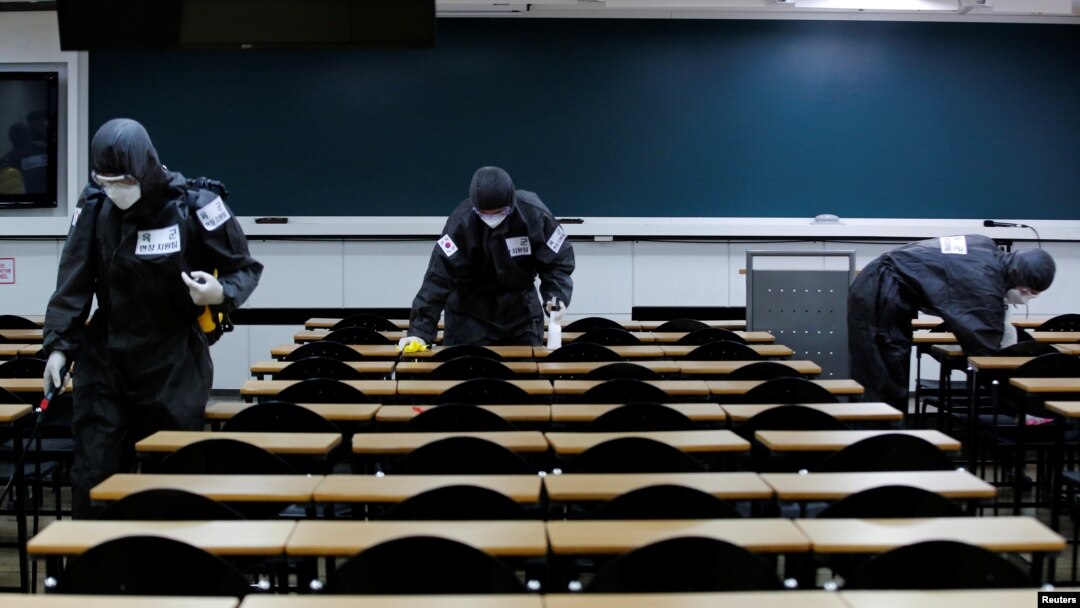South Korea has designated several southeastern provinces, hard hit by COVID-19 as "special disaster zones," making them eligible for financial support and relief. The designation is usually reserved for areas affected by typhoons, floods and other national disasters.
South Korea has 8,162 coronavirus cases.
Iran, the world’s third-hardest hit by COVID-19, confirmed Sunday an additional 113 deaths due to the virus, raising the country’s coronavirus death toll to 724.
The Iranian government announced Friday it will employ near-martial law to combat the virus. State television said security forces would fan out across the country, clearing shops, streets and roads of people.
Iranian global health scholar Kamiar Alaei told VOA Persian that he believes the actual number of cases in Iran is 40,000.

People queue in line to receive packages for precautions against COVID-19 coronavirus disease outside Meydane Valiasr metro station in Tehran, March 15, 2020.
Europe has replaced China as the epicenter of the coronavirus pandemic, the World Health Organization confirmed.
WHO chief Tedros Adhanom Ghebreyesus told reporters Friday in Geneva that in Europe “more cases are now being reported every day than were reported in China at the height of its epidemic.''
In Italy the number of coronavirus infections has soared, bringing the total number infected in the country to more than 21,000. The number of coronavirus deaths in Italy, the hardest-hit country outside of China, stood at 1,441.
Denmark and Poland joined other countries Saturday in closing their borders to most travelers, while Russia said it will shut its borders with Norway and Poland on Sunday.
Spain announced Saturday it would employ steps similar to Italy in locking down its country for two weeks. Spanish Prime Minister Pedro Sanchez, in announcing the measures, said, starting immediately, residents would only be allowed to leave their homes to buy food and medicine, to go to work, to find medical care or to help care for the young or elderly.
A police officer stands guard preventing access to the beach in Barcelona, Spain, March 15, 2020.
Spain has more than 6,300 confirmed COVID-19 cases, which represented an increase of more than 1,500 in 24 hours. The death toll has risen to 196. Spain has the fifth-highest number of cases, after China, Italy, Iran and South Korea.
France has also announced new restrictions to contain the virus. Officials have already closed major tourist attractions -- the Eiffel Tower and the Louvre -- but starting Sunday, most other places where people gather -- restaurants, cinemas, non-essential retail -- will be closed as well. Municipal elections Sunday, however, are still taking place. France has recorded about 4,400 confirmed cases of COVID-19, and 91 deaths.
The United States Saturday expanded its travel ban with Europe to include the United Kingdom and Ireland, and President Donald Trump added that he is considering restricting travel within the United States as well.
The director of the National Institute of Allergy and Infectious Diseases, Dr. Anthony Fauci, cautioned that the situation will continue to worsen despite the increased efforts.
The United States has just over 3,000 confirmed coronavirus cases and 60 deaths from the disease. New York state, which has instituted a containment zone around a cluster of infections in the town of New Rochelle, Saturday reported its first death from COVID-19.
A patient arrives to be tested for the coronavirus at Glen Island Park, March 13, 2020, in New Rochelle, New York.
Australia says all international travelers to the country will have to self-isolate for 14 days and no cruise ships from foreign ports will be allowed to dock.
Prime Minister Scott Morrison said Sunday the actions are aimed at stopping the spread of COVID-19 in Australia.
Four African countries -- Mauritania, Rwanda, Seychelles and Central African Republic -- confirmed their first coronavirus cases Saturday. Rwanda, Senegal, Madagascar, Mauritius, Morocco and Kenya immediately announced tougher measures, such as bans on public gatherings, stopping flights and closing schools and universities, to combat COVID-19.
There were more than 60 confirmed cases in Africa as of Friday, according to the WHO.
More than 156,000 people have been infected by COVID-19 worldwide, with the most in China, where over 3,000 patients have died and 67,000 people have recovered. While China still accounts for more than 60% of global infections, it reported just 10 new COVID-19 infections Saturday.
The very slight increase in new cases does not mean, however, that the virus is on its way out of the Asian nation. There are still thousands of Chinese who remain infected with the virus.
Ardita Dunellari at the White House, Lisa Schlein in Geneva, Margaret Besheer in New York and VOA Persian’s Farhad Pouladi and Arian Risbaf contributed to this report.


